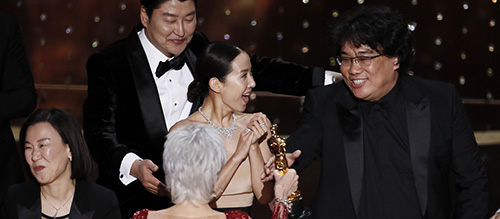Why Parasite’s Oscars Dominance Matters
I usually hate watching the Oscars. We spend the whole year watching tons of movies, and speculating about what could and should make it. We express our joy/outrage at the nominees, celebrating those who we loved and lamenting those who were snubbed. Finally, we sit down to watch a three-and-a-half hour telecast that includes approximately ten million musical performances, introductions from people who go on to introduce someone else to introduce an award, and way too many advertisements. Why subject ourselves to all of this? Why not ignore them and focus exclusively on our own thoughts on film, independent of this Americentric body of filmmakers who couldn’t manage to recognize Hitchcock, Kubrick, or a woman deserving of a unisex award?
Taking away the obvious answers of “because it’s the largest awards show” and “people care about it”, the reason is for moments like last night.
Bong Joon-ho and company walked away with what they absolutely deserved – the Oscars for Best Original Screenplay, Best International Feature (a first for South Korea), Best Director and Best Picture. After weeks of having nothing really to say except that Parasite deserves every award it’s nominated for – and subjecting myself to the “insider” opinions about 1917’s impending dominance – I can gladly stop worrying and be happy for a movie that I loved.
As great as the win is for film fanatics, my initial thoughts were still with issues the Oscars has failed to properly address. Parasite winning doesn’t change the fact that women and non-white filmmakers are lacking representation in the nominations, winners, and larger industry. There’s plenty of work to be done in making sure diverse voices are heard and celebrated across every aspect of filmmaking. But, Parasite winning, and winning so big, shows that maybe those barriers are being broken down. It’s a really big deal that a South Korean film was able to take the two biggest awards at the ceremony. I can’t fathom the joy everyone involved in that production is feeling, and those of us who were fans of Parasite should partake in that joy to whatever extent we can.
Parasite deserves the win because it is powerfully evocative. Yes, it’s an incredible piece of filmmaking, but it’s the emotional and political resonance that crosses language and national borders that makes it so amazing. I remember walking out of the theater, having already committed to writing about it, and feeling thoroughly bummed out by my experience. It’s hard to find the words for a film that ends on a note of false hope, showing the protagonist to be dreaming once again – having potentially learned nothing from his experience in the film. Seeing three families be torn apart because of prejudice, wealth/social inequality, and a lack of empathy is depressing. It’s a film that I can’t bring myself to watch many more times because the emotions are so overwhelming that I come out of it feeling drained – as if a portion of my self departed and stuck to these people who aren’t even real.
Watching and reading about Bong Joon-ho has been a great experience all its own. Learning of how he went about creating this film is a subtle primer on how to watch movies from a visual storytelling perspective. He wanted to work in limited space, and use those limits to tell a story about the lives these different people lead. He meticulously blocked out the acting and design during the writing phase, an example of how much deeper films are than the average audience member expects. His acceptance speech for Best Director shows his sense of humor, his passion for film, and a humbleness that I don’t think I would bother with if I had just been declared the “best” anything. His shoutouts to Martin Scorsese and Quentin Tarantino show why it’s important that he’s here – promotion of artists really does make a difference.
That’s why the Oscars matter, and why representation is so vital. It’s not about tokenism, virtue signalling or being “politically correct” – it’s so everyone has an opportunity to look at their TV and see someone like them succeeding on the biggest stage in the world. Actions have an impact, and Parasite’s success is a message to filmmakers literally all over the world that they can be the best. Their film isn’t limited to this or that category at the Academy Awards, and their voice is valuable. I can’t wait to sit through another miserable four hours to watch someone in twenty years say that they were inspired by Bong Joon-ho, and thank him in their acceptance speech. Parasite will be an historical Best Picture winner that we can all celebrate for years to come.


